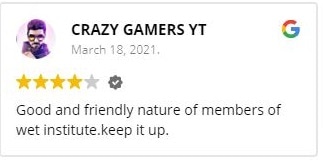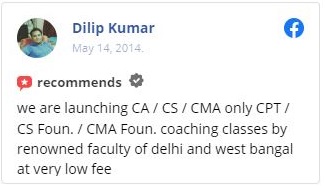Online Admission Process Apply (2025-26) for CTET Course in Delhi NCR: Eligibility Criteria, Scope, Fees, Duration, Syllabus, and Career Opportunities....
Introduction and Overview of CTET Course 2025-26
The Central Teacher Eligibility Test (CTET) is a national-level examination conducted by the Central Board of Secondary Education (CBSE) in India. This test primarily aims to assess the eligibility of candidates for appointment as teachers in classes I to VIII across various central government schools, including Kendriya Vidyalayas and Navodaya Vidyalayas, as well as private schools that choose to consider CTET scores for teacher recruitment.
Key Objectives
Teacher Qualification
One of the main objectives of CTET is to serve as a benchmark, ensuring that individuals aspiring to become teachers possess the necessary skills and knowledge to deliver quality education.
Standardization
Additionally, the test standardizes the eligibility criteria for teaching positions across different schools, promoting uniformity in the recruitment process.
Enhancing Quality
By evaluating candidates on their understanding of pedagogy, child development, and subject-specific knowledge, CTET aims to enhance the overall quality of education in the country.
Examination Structure
CTET consists of two papers:
- Paper I: For candidates aspiring to teach classes I to V (primary stage).
- Paper II: For candidates aiming to teach classes VI to VIII (upper primary stage).
Candidates can choose to appear for one or both papers, depending on their qualifications and teaching aspirations.
Importance of CTET
Employment Opportunities
A qualifying score in CTET is often a mandatory requirement for teacher recruitment in many schools, making it a crucial step for aspiring educators.
Professional Development
Furthermore, preparing for CTET helps candidates enhance their teaching skills and deepen their understanding of educational practices, contributing significantly to their overall professional growth.
CTET Course Eligibility Criteria for 2025-26
For Paper I (Classes I to V)
Educational Qualification: To be eligible for Paper I, candidates must have at least 50% marks in higher secondary (or its equivalent) along with a 2-year diploma in elementary education. Alternatively, a graduation degree with a 1-year Bachelor of Education (B.Ed.) is acceptable. Importantly, candidates who are appearing for the final year of their diploma or B.Ed. programs may also apply.
For Paper II (Classes VI to VIII)
Educational Qualification: For Paper II, candidates need a minimum of 50% marks in graduation along with a 1-year B.Ed. Alternatively, candidates can qualify with at least 50% in higher secondary and a 4-year Bachelor in Elementary Education (B.El.Ed.). Similar to Paper I, candidates appearing for the final year of their B.Ed. or B.El.Ed. programs are also eligible to apply.
Eligibility for Paper I of the CTET (Classes I to V)
To be eligible for Paper I of the Central Teacher Eligibility Test (CTET) for teaching in Classes I to V, candidates must meet the following educational qualifications:
Higher Secondary Qualification:
First and foremost, candidates must have completed higher secondary (Class 12) or its equivalent, with a minimum of 50% marks.
Diploma in Elementary Education:
In addition to this, candidates should hold a 2-year diploma in elementary education (D.El.Ed.).
Alternative Qualifications:
Alternatively, candidates with a graduation degree coupled with a 1-year Bachelor of Education (B.Ed.) are also eligible.
Final Year Candidates:
Furthermore, those who are in the final year of their D.El.Ed. or B.Ed. program can also apply.
Eligibility for Paper II of the CTET (Classes VI to VIII)
To be eligible for Paper II of the Central Teacher Eligibility Test (CTET) for teaching in Classes VI to VIII, candidates must meet the following educational qualifications:
Graduation Degree:
- Candidates should possess a bachelor’s degree with a minimum of 50% marks.
- Candidates should possess a bachelor’s degree with a minimum of 50% marks.
Bachelor of Education (B.Ed):
- Must have completed a 1-year Bachelor of Education (B.Ed.) program.
- Must have completed a 1-year Bachelor of Education (B.Ed.) program.
Alternative Qualifications:
- Candidates with a minimum of 50% marks in higher secondary (Class 12) and a 4-year Bachelor in Elementary Education (B.El.Ed) are also eligible.
- Candidates with a minimum of 50% marks in higher secondary (Class 12) and a 4-year Bachelor in Elementary Education (B.El.Ed) are also eligible.
Final Year Candidates:
- Those appearing for the final year of the B.Ed or B.El.Ed program can apply.
CTET Application & Registration Form 2025-26
Step-by-Step Guide for CTET Application and Registration (2025-26)
1. Official Notification
Begin by checking the official CTET notification for important details regarding eligibility, key dates, and the exam structure.
2. Online Registration
Next, visit the official CTET website at ctet.nic.in. Click on the “Registration” link to create your account.
3. Fill in Details
Once on the registration page, enter your personal information, including your name, date of birth, email address, and mobile number. Don’t forget to create a password for your account.
4. Complete the Application Form
After logging in with your credentials, fill out the application form with your educational qualifications, address, and other required details.
5. Document Upload
Subsequently, upload the necessary documents, which typically include:
- A recent passport-sized photograph
- Your signature
- Relevant educational certificates
6. Application Fee Payment
Next, pay the application fee online using one of the available methods, such as credit/debit card or net banking. Be sure to keep a receipt of the payment for your records.
7. Review and Submit
Before finalizing your application, carefully review all the entered details to ensure accuracy. Once verified, submit the application form.
8. Download Confirmation
After successful submission, download the confirmation page for your records. This will serve as proof of your application.
Important Instructions for the CTET Application Form 2025-26
Important Guidelines for the CTET Application Process
1. Eligibility Check
Before applying, ensure you meet the eligibility criteria for your desired paper (Paper I or Paper II).
2. Online Registration
When registering, use a valid email address and mobile number, as all communications regarding your application will be sent to these contacts.
3. Document Preparation
Prepare scanned copies of your passport-sized photograph and signature according to the specified format and size requirements mentioned in the notification.
4. Fill Out Carefully
Fill in all details accurately in the application form. It’s essential to double-check your personal, educational, and contact information before submitting.
5. Application Fee
Be aware of the application fee structure. Make sure to pay the fee within the stipulated time frame and keep the payment receipt for your records.
6. Final Review
Conduct a thorough review of the entire application form before submission. Once submitted, changes may not be permitted.
7. Admit Card
After successful registration, regularly check the CTET website for updates regarding the release of the admit card, as it is required to sit for the exam.
8. Keep Copies
Save copies of the completed application form, payment receipt, and any confirmation emails for future reference.
9. Follow Deadlines
Adhere strictly to all deadlines for registration, fee payment, and other important dates mentioned in the official notification.
10. Updates and Notifications
Lastly, keep an eye on the official CTET website for any updates or changes to the application process or exam schedule.
CTET 2025-26 Exam Syllabus
The syllabus for the Central Teacher Eligibility Test (CTET) is divided into two papers: Paper I (for Classes I to V) and Paper II (for Classes VI to VIII). Here’s a detailed overview:
Paper I Syllabus (Classes I to V)
Child Development and Pedagogy:
- Understanding children’s characteristics and their needs.
- Factors influencing learning.
- Teaching-learning processes.
Language I (English/Hindi):
- Language comprehension, pedagogy, and grammar.
- Teaching methods and approaches for language development.
Language II (English/Hindi):
- Understanding and comprehension of a second language.
- Pedagogical strategies for teaching a second language.
Mathematics:
- Number system, algebra, geometry, and measurement.
- Teaching methodologies for mathematics.
Environmental Studies:
- Understanding of the environment and its components.
- Teaching methods for promoting environmental awareness.
Paper II Syllabus (Classes VI to VIII)
Child Development and Pedagogy:
- Understanding the development of adolescents and their needs.
- Learning and teaching processes.
Language I (English/Hindi):
- Proficiency in the language, comprehension, and grammar.
- Methods for teaching language effectively.
Language II (English/Hindi):
- Understanding the second language’s teaching strategies.
- Understanding the second language’s teaching strategies.
Mathematics and Science:
- Subject-specific knowledge in mathematics and science (biology, physics, and chemistry).
- Teaching methods and approaches for these subjects.
Social Studies:
- History, geography, political science, and economics.
- Pedagogical strategies for teaching social studies.
Teaching Methodology:
- Strategies and approaches for effective teaching and assessment.
CTET Paper I Sections
CTET Paper I, designed for candidates aiming to teach Classes I to V, consists of five sections:
Child Development and Pedagogy:
- Focuses on understanding child development, learning theories, and effective teaching methods.
- Focuses on understanding child development, learning theories, and effective teaching methods.
Language I:
- Assesses proficiency in the medium of instruction (usually English or Hindi), including comprehension and grammar.
- Assesses proficiency in the medium of instruction (usually English or Hindi), including comprehension and grammar.
Language II:
- Evaluates understanding and pedagogy of a second language (other than Language I), focusing on language skills and teaching strategies.
- Evaluates understanding and pedagogy of a second language (other than Language I), focusing on language skills and teaching strategies.
Mathematics:
- Covers mathematical concepts and operations, number systems, geometry, and pedagogical techniques for teaching math.
- Covers mathematical concepts and operations, number systems, geometry, and pedagogical techniques for teaching math.
Environmental Studies:
- Includes topics related to the environment, basic scientific principles, and methods for teaching environmental awareness.
CTET Paper II Sections
CTET Paper II, designed for candidates aiming to teach Classes VI to VIII, consists of six sections:
Child Development and Pedagogy:
- Focuses on the development of adolescents, learning processes, and effective teaching strategies.
- Focuses on the development of adolescents, learning processes, and effective teaching strategies.
Language I:
- Assesses proficiency in the medium of instruction (typically English or Hindi), including comprehension, grammar, and teaching methods.
- Assesses proficiency in the medium of instruction (typically English or Hindi), including comprehension, grammar, and teaching methods.
Language II:
- Evaluates understanding and pedagogy of a second language (other than Language I), focusing on language skills and effective teaching strategies.
- Evaluates understanding and pedagogy of a second language (other than Language I), focusing on language skills and effective teaching strategies.
Mathematics:
- Covers mathematical concepts, operations, algebra, geometry, and methodologies for teaching mathematics effectively.
- Covers mathematical concepts, operations, algebra, geometry, and methodologies for teaching mathematics effectively.
Science:
- Includes topics from biology, physics, and chemistry, along with pedagogical strategies for teaching science subjects.
- Includes topics from biology, physics, and chemistry, along with pedagogical strategies for teaching science subjects.
Social Studies:
- Encompasses history, geography, political science, and economics, with a focus on teaching methods and approaches for social studies education.






























